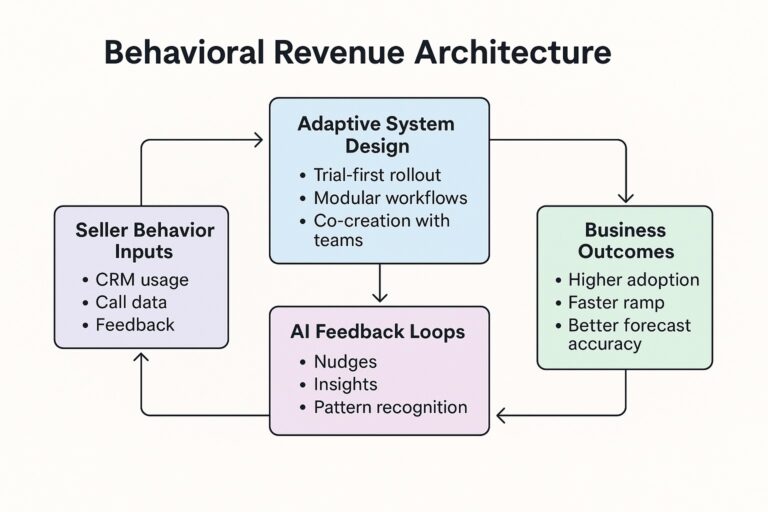Behavior-First Sales Operations: Designing Adaptive Revenue Systems That Align with Human Selling Patterns in the AI Era

Introduction: The Crisis of Static Sales Processes
For over a decade, I’ve operated at the intersection of sales strategy, technology, and human behavior. Throughout my career, I’ve witnessed countless sales operations initiatives—from meticulously optimized CRM instances to intricately designed dashboards—fail to achieve sustained adoption or meaningful impact. One truth stands clear: no sales process survives contact with the reality of seller behavior.
Sales Operations traditionally prioritizes efficiency, data integrity, and compliance. But amid all these optimizations, we’ve overlooked the critical human element—the seller. Sellers operate on emotional drivers, psychological rhythms, and behavioral nuances that rigid systems often fail to accommodate. Today, as AI reshapes sales technology and processes, we must recognize that true optimization emerges only when we design systems for the realities of human selling.
This insight has led me to a pivotal realization: Sales Ops must evolve beyond static frameworks into dynamic, behavior-driven systems.
The Psychology of Selling: How Reps Actually Behave
No two sellers are identical. Yet most operational frameworks are designed under the false assumption that uniformity can be imposed. In practice, I’ve noticed distinct behavioral patterns:
-
High performers rely heavily on personal sales skills—discovery, objection handling, situational judgment. Technology is an enabler, never a dependency. These reps resist tools only when they perceive friction or irrelevance.
-
Low performers often seek salvation in technology. They enthusiastically adopt new tools but struggle to effectively integrate them into their selling processes, requiring continuous training and support.
One striking example was the introduction of a sophisticated automated proposal-generation tool, designed to accelerate advertiser proposals using algorithmic logic. While theoretically sound, it failed in practice because reps frequently modified outputs. The core reason was psychological and practical: sellers trusted their personal judgment and nuanced client insights more than an impersonal algorithm, highlighting a fundamental gap between technology’s precision and human intuition in real-world selling scenarios.
Industry veterans emphasize that “tech adoption succeeds only when it reduces seller friction and clearly demonstrates personal value.”
Trial-First Sales Operations: A New Framework
The era of universally imposed processes is over. The future belongs to a more agile, trial-first approach. Instead of broad rollouts, successful organizations conduct controlled, iterative pilots.
At a major SaaS company, the rollout of an AI-based sales assistant was trialed initially with just 600 sales reps. Feedback gathered during this controlled test resulted in critical refinements, leading to successful global deployment across 15,000+ sellers, doubling active user adoption within a month.
In my experience, introducing CRM-based finance approvals succeeded precisely because we piloted it first within a single region, adjusted based on real-world feedback, and then scaled confidently.
A contrasting example was the deployment of a prominent lead sourcing tool, initiated due to intense executive advocacy. Despite initial excitement, usage dramatically declined when the tool failed to align with seller behavior and workflows.
The trial-first approach is validated by its simplicity and is supported by behavioral science theories such as the “Lean Startup” methodology, which emphasizes iterative testing, validated learning, and rapid feedback loops. Additionally, psychological research on habit formation and incremental behavior change, such as BJ Fogg’s Tiny Habits framework, further reinforces the effectiveness of gradually introducing and refining new processes.
-
Begin with manageable, clearly defined pilot programs.
-
Observe and measure genuine behavioral changes and adoption rates.
-
Scale only after validating real-world effectiveness.
This framework aligns closely with how behavioral science recommends managing change: incrementally and iteratively, using continuous feedback loops.
The Role of AI in Behavior-First Sales Ops
AI is more than automation—it’s becoming the cornerstone of behavioral optimization in sales operations. For example, a McKinsey study found that companies implementing AI-driven sales analytics saw an average increase of 50% in leads and appointments. Additionally, conversation intelligence platforms have helped organizations like Salesforce and Gong achieve significant improvements in seller productivity by analyzing thousands of sales interactions to pinpoint exactly where sellers succeed or face challenges. Technologies like conversation intelligence tools provide unprecedented visibility into sales interactions, identifying exactly where sellers gain or lose prospect engagement.
Behavioral analytics tools now detect seller fatigue, identify task abandonment patterns, and recommend targeted interventions. Industry leaders describe this as AI “identifying top sales behaviors and using them as a standard across the salesforce.”
My own vision extends to specialized AI micro-agents, each proficient in distinct sales tasks—from email drafting and customer research to conversation assistance—accessible through a single, cohesive interface. Such systems dramatically reduce cognitive load, helping sellers focus on relationship-building rather than operational minutiae.
The perception of AI as a “Big Brother” is rapidly dissipating as sellers experience firsthand AI’s role as a powerful enabler rather than a surveillance tool. AI’s true potential lies in its ability to adapt dynamically to seller behaviors, enhancing their strengths and mitigating weaknesses without friction.
Rewiring RevOps for the Future
The future demands a fundamental rewiring of revenue operations: shifting from static playbooks to behavioral feedback loops.
This future model consists of:
-
Adaptive Revenue Stacks that respond dynamically to seller interactions and behavioral analytics.
-
Dynamic Playbooks continuously refined through AI-generated insights and real-time feedback.
-
Modular and Flexible Processes tailored to different seller personas, customer segments, and market conditions.
Sales Ops leaders of tomorrow must blend expertise in behavioral psychology, adaptive systems design, and AI orchestration. Leading SaaS organizations already embrace modular, adaptive, and human-centric systems.
This new era calls for Behavioral Revenue Architecture, an innovative model combining data-driven decision-making with human behavioral understanding. Specifically, co-creating solutions with sales teams fosters deeper engagement, ownership, and practical insights, significantly enhancing adoption rates and driving superior outcomes. By directly involving sellers in the design and iterative refinement of processes, organizations ensure that operational tools and practices are intuitive, relevant, and genuinely supportive of sellers’ daily workflows., an innovative model combining data-driven decision-making with human behavioral understanding, co-creating solutions with sales teams rather than imposing them.

Sales Ops Must Humanize to Maximize
Tomorrow’s winners won’t merely rely on technological prowess; they’ll be distinguished by their commitment to human-centric, adaptive sales operations.
These forward-thinking organizations will:
Rigorously pilot new processes before widespread implementation.
Continuously adapt operations based on real-world behavior and feedback.
Leverage AI not as a replacement but as a powerful augmentation of human capabilities.
Sales Ops leaders will evolve into strategic architects and behavioral scientists—professionals who don’t just manage tools and workflows but actively shape the systems that empower reps to succeed. For example, imagine a Sales Ops leader who notices that reps are skipping a CRM step intended to collect strategic deal data. Instead of enforcing compliance through rigid policies, they interview reps, uncover that the step breaks their flow, and use AI to auto-fill most fields while designing a simpler input interface based on rep feedback. This blend of empathy, experimentation, and systems thinking is the hallmark of a behavioral architect in modern sales organizations—designing systems that truly understand and support the human realities of selling.
We are entering an era where sales operations systems think, learn, and adapt in real time—maximizing efficiency, revenue, and seller satisfaction.
The organizations embracing behavior-first operations today will lead tomorrow—creating more successful, resilient, and fulfilled sales teams